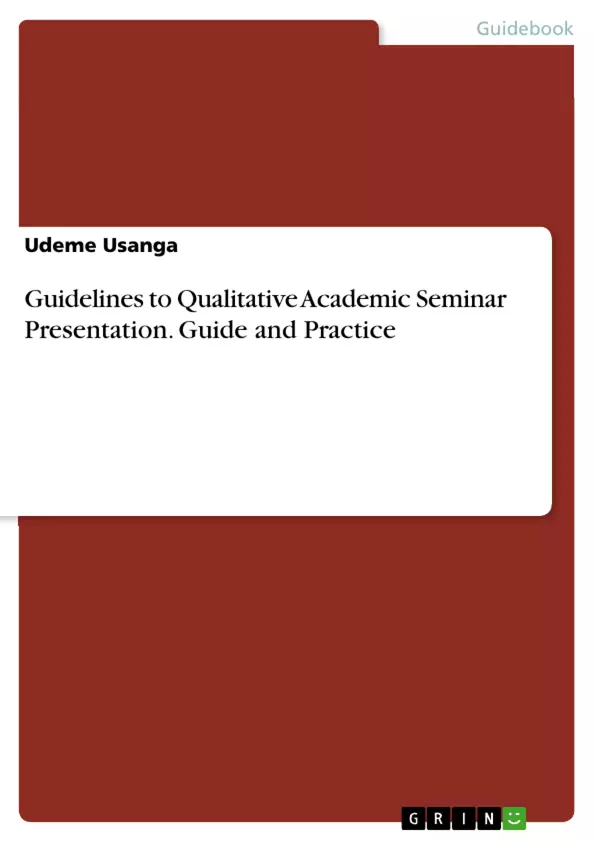The primary objective of seminar presentation is to enhance presentation skills when persuading, educating, or informing an audience. Specifically, it provides a focus on the fundamental aspects of a quality academic, professional and business communications including structure, preparation and strategy for delivery, using visual aids, and handling question and answer sessions. The presenter/student practices by preparing and delivering an ideal real-life academic/business presentation. Strict adherence to the instructions outlined allows the presenter to evaluate his/her progress and alter any distracting behaviours before and during presentation. It also enables the participant to learn by doing. The aim of this chapter is to introduce students to simple principles on how to plan, write and present their seminars. Finally, in addition to this is the description of some assessment methods and tools use to assess seminar presenters.
Inhaltsverzeichnis (Table of Contents)
- Guidelines to qualitative academic seminar presentation
- Introduction
- Why present academic seminars
- Objectives
- Scope
- Method
- Developing Writing Skills
- Developing Reading and Critiquing Skills
- Developing Oral Skills
- Developing Citizenship Skills
- Preparing Future Faculty
- Academic Seminar/micro-conference Model
- Results and Discussion
- Academic Seminar Model Course Structure
- Grading Scheme
- Variation
Zielsetzung und Themenschwerpunkte (Objectives and Key Themes)
This paper aims to provide students with a comprehensive guide on presenting academic seminars effectively, encompassing research, teaching, and service aspects. The paper aims to provide students with the skills and knowledge necessary to plan, write, and deliver effective seminar presentations. This model also intends to expose students to the interplay of research, teaching, and service, fostering a more holistic understanding of academic responsibility.
- Integrating technical writing skills into the curriculum
- Developing reading and critiquing skills through peer review
- Enhancing oral presentation skills
- Promoting a sense of academic citizenship
- Preparing students for future academic careers by simulating a mini-conference setting
Zusammenfassung der Kapitel (Chapter Summaries)
The paper begins by outlining the importance of seminars for students in tertiary institutions. It emphasizes the role of seminars in preparing students for future faculty positions, exposing them to the interconnectedness of research, teaching, and service.
The paper then delves into the importance of written and oral communication skills, highlighting their relevance to academic responsibility. It explores various methods for developing writing skills, including interdisciplinary collaboration and the use of technical research papers.
The paper further emphasizes the need for reading and critiquing skills and suggests using peer review and published papers to enhance these skills. It also stresses the importance of developing oral skills, pointing out the significance of seminar courses in providing students with the opportunity to practice and refine their presentation skills.
The paper then explores the concept of academic citizenship and its role in preparing future faculty. It explores the importance of participating in peer review, refereeing technical papers, and contributing to the wider academic community.
The paper concludes by presenting an Academic Seminar/micro-conference model, outlining its structure and implementation. It highlights the key elements of the model, including student research projects, mini-lectures, and a mini-conference involving paper submissions, peer review, and presentations.
Schlüsselwörter (Keywords)
The paper focuses on the key concepts of seminar presentation, academic responsibility, research, teaching, service, communication skills, technical writing, peer review, and the Academic Seminar/micro-conference model. This paper explores the development of these skills in a tertiary institution context.
Frequently Asked Questions
What is the primary objective of a seminar presentation according to this guide?
The primary objective is to enhance skills in persuading, educating, or informing an audience, specifically focusing on structure, preparation, and delivery strategy.
What skills does the guide help students develop?
It focuses on developing technical writing skills, reading and critiquing skills through peer review, oral presentation skills, and academic citizenship.
What is the "Academic Seminar/micro-conference Model"?
It is a structure that simulates a professional mini-conference, involving student research projects, paper submissions, peer reviews, and oral presentations.
How does the guide prepare students for future faculty positions?
By exposing them to the interplay of research, teaching, and service, and providing a holistic understanding of academic responsibility.
Does the guide cover assessment methods?
Yes, it includes descriptions of assessment methods and tools used to evaluate seminar presenters, including a grading scheme.
- Citar trabajo
- Udeme Usanga (Autor), 2012, Guidelines to Qualitative Academic Seminar Presentation. Guide and Practice, Múnich, GRIN Verlag, https://www.grin.com/document/1387629



